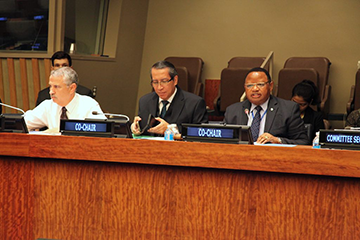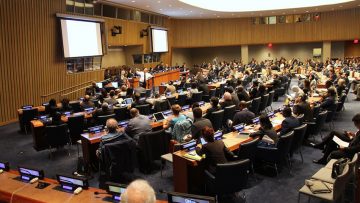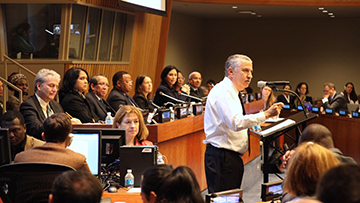Globalization must leave no one behind, senior UN officials tell joint meeting on socio-economic issues
At a joint meeting of the United Nations Economic and Social Council (ECOSOC) and the General Assembly’s main economic and financial committee, the respective heads of the two UN bodies today highlighted the need for the benefits of globalization to reach all countries and all peoples.
“We have a responsibility to promote narratives that acknowledge that sustainable prosperity for all will come through inclusion rather than exclusion,” said ECOSOC President Frederick Shava in his opening remarks to the joint meeting.
Similarly in his own remarks, Dian Triansyah Djani, Chair of the General Assembly’s Second Committee highlighted: “In our world of gaps, there should be special attention of enabling global environment for countries, in particular the developing countries, to provide a considerable share to the global achievements of the SDGs [Sustainable Development Goals].”
‘2030 Agenda provides answers to questions global citizens are asking’
The annual joint meeting is held every year to discuss important economic and financial issues among both bodies’ membership. This year it was under the theme The changing political economy of globalization: Multilateral institutions and the 2030 Agenda.
Further in his remarks, Mr. Djani highlighted the importance of collective action for the achievement of SDGs. “We, collectively, will have to demonstrate that the 2030 Agenda provides the answers to the questions being asked by global citizens. The many should work together so the few helpless one are not left behind because of globalization,” he emphasized.
 Also, Mr. Shava underlined the need to change the “political narratives” that advocate for isolationism, “We have a responsibility to promote narratives that acknowledge that sustainable prosperity for all will come through inclusion rather than exclusion,” he said.
Also, Mr. Shava underlined the need to change the “political narratives” that advocate for isolationism, “We have a responsibility to promote narratives that acknowledge that sustainable prosperity for all will come through inclusion rather than exclusion,” he said.
“Too daunting are the challenges of climate change, poverty, conflicts and terrorism, to name a few. The increasingly complex nature of these challenges calls for global solutions as no one country can deal with these issues alone,” the ECOSOC President added.
World transformed by seismic events – from iPhone to financial meltdown in 18 months
The joint meeting today also featured a keynote address by Pulitzer Prize winning journalist and New York Times Op-Ed columnist Thomas Friedman who in his speech stressed: “We were in an age of acceleration where we needed to reimagine and reflect.” The world is witnessing three non-linear accelerations all at the same time: the market (globalization), Mother Nature (climate change, population growth), and Moore’s Law (technology).
 These three accelerations are reshaping the world’s politics, geopolitics, the workplace, community, and ethics, he continued.
These three accelerations are reshaping the world’s politics, geopolitics, the workplace, community, and ethics, he continued.
Mr. Freidman went on to recount a series of seismic social and technological events that occurred in 2007, when, among others: Steve Jobs unveiled the iPhone beginning the smartphone/apps revolution; Facebook went global; Twitter went global; Airbnb hit the marketplace; “Amazon came out with something called the Kindle;” Github emerged; and IBM launched Watson.
Further, he said the cost of sequencing a human genome went from around $100 million down to $1, Google bought YouTube, Intel went off silicon to expand Moore’s Law, and cloud computing took off. “2007 was the biggest technological inflection point since Gutenberg invented the printing press, and we missed it [because] the 2008 economic and financial collapse happened right after,” he said.
Subsequently, the market is being fundamentally reshaped. “This is not your grandmother’s globalization,” said Mr. Friedman. Although trade in physical goods and financial products and services – the hallmarks of 20th century globalization – have flattened out and even declined in recent years, the globalization of flows means the world has never been more interconnected.
“And you haven’t seen anything yet,” he continued, noting that the flows of friends, of renters, opinions, crowdfunding, instant messages, peer-to-peer payments, pictures, education, college courses, design tools, music, video, news, cloud-based tools, searches, raw video, “all of these flows are exploding, and they are the new globalization tying us together.” As such, he argued that the country that built infrastructure and educated its people to connect up to more [of these] flows will be the country that thrives in the 21st century.
 Mother Nature is exponentially changing too, through climate change, population growth, and biodiversity loss. “You’re all familiar with this one, but Mother Nature is going through her own exponential changes, which we’re seeing in Florida right now,” he noted.
Mother Nature is exponentially changing too, through climate change, population growth, and biodiversity loss. “You’re all familiar with this one, but Mother Nature is going through her own exponential changes, which we’re seeing in Florida right now,” he noted.
Mr. Friedman went on to stress that the workplace would be irrevocably altered and it is necessary to convert artificial intelligence to intelligent assistance and algorithms to allow workers to adapt to exponential change. Lifelong learning will be essential, and “building walls will not stop this change.” Politics and geopolitics would have to adapt as well, as parties will need to become more heterodox and less ideological, or fail.
Lastly, ethics will have to evolve. “If you want to make something, you’re living in the greatest period in history, but if you want to break something, you’re also living in the greatest period in history,” he said. “What every human being believes now matters.” It will be necessary to bring back the ‘Golden Rule’ through strong families and healthy communities.
Source: UN News Centre
Photos: UN DESA/Predrag Vasic


Follow Us